Legacy Stories
Kevin Ash
Kevin Ash was a talented all-around athlete growing up in Minnesota. After the events of September 11, 2001, Ash was called to serve and enlisted in the Minnesota National Guard. Ash then went on three deployments including a 22 month stint in Iraq. When he returned home, he suffered a major TBI in a rugby game in 2013 which hospitalized him. Ash never fully recovered from this final injury and died in 2017 at age 34. Dr. Ann McKee of the VA-BU-CLF Brain Bank later diagnosed Ash with CTE. His family went public with his story in hopes his ultimate sacrifice can advance CTE research to solve the invisible wounds of war.
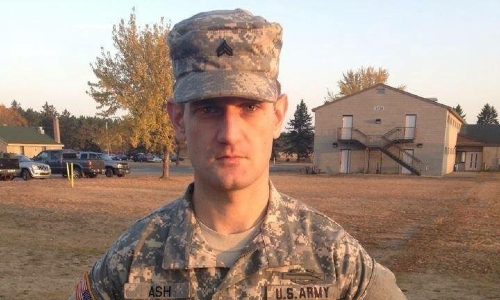
By his Mother, Joy Kieffer, his Sister, Erica Ash, and his Brother, Connor Martin
Brother, Son, American Hero
Kevin Ash loved people. Throughout his life he was a team player, a leader, and a protector of others who understood what it was to struggle and to overcome.
He grew up in the small town of Owatonna, Minnesota with his mother Joy Kieffer and his father Daniel Ash and step-mother Gloria Ash, who lived in Austin, Minnesota. Kevin Ash grew up with his two siblings: older sister Erica and younger brother Conner. As a child, Kevin was quiet, but driven, always striving to overcome learning disabilities. He continually pushed himself to accomplish what was needed to move forward.
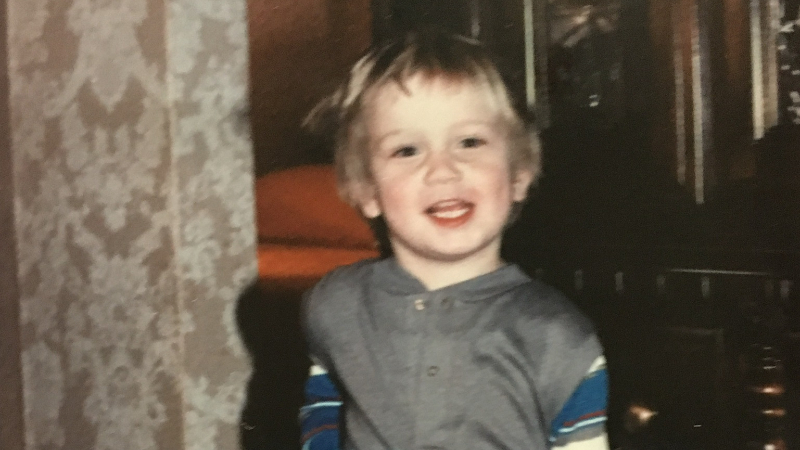
Kevin found his place in athletics, where he excelled from a young age. He played tennis, ran track, participated in youth intramural wrestling, and played 4 years of high school football.
He was tenacious. Kevin knew what he wanted and how to make it happen. During his senior year of high school, between football and track season, he signed up for the Owatonna Invite open wrestling tournament, even though he hadn’t wrestled since he was nine years old. To everyone's surprise, including the bewildered high school wrestling coach, Kevin took third place.
With his physical prowess and big heart, Kevin wanted to serve and protect others. He knew that a career in law enforcement and possibly the military was the path for him. He graduated from high school in 2001, and enrolled in the local community college to begin his work toward a law enforcement degree.
His plans changed after 9/11. Kevin regarded the attack on American soil as an attack on our national identity. It was a personal call to action. Such acts of terrorism had no place in the US, the country he loved. He felt called to protect others and immediately decided to enlist in the Minnesota Army National Guard, where he could be a citizen soldier.
His love for working out, achieving athletic goals, and being part of a team all helped him successfully complete basic training. Kevin never gave anything less than 110% and the Army National Guard gave him the chance to combine his drive and talents with his desire to serve. He was an asset to his unit.
Immediately after completing basic training, Kevin’s unit, the Minnesota Red Bulls, was sent to Kosovo on a police mission. They assisted UN-sanctioned forces in the area. His work included searching houses, confiscating contraband weapons, and locating landmines.
On base, Kevin spent his time laughing, joking, and pulling pranks with his friends. He went to the movies and made frequent contact with his family back in Minnesota, even sharing a picture of a Humvee he somehow got stuck over a gap, balancing on two wheels, 10 feet off the ground. The photo showed he and his comrades standing underneath the truck laughing.
During that first deployment, he was just a 20-year-old guy, out in the world, working hard and enjoying life with his buddies.
When he returned home, he took up martial arts, naturally got his black belt, and started to teach classes.
Things began to change drastically during Kevin’s second deployment to Iraq where he endured the longest deployment allowed for a Minnesota Army National Guard unit: 22 months.
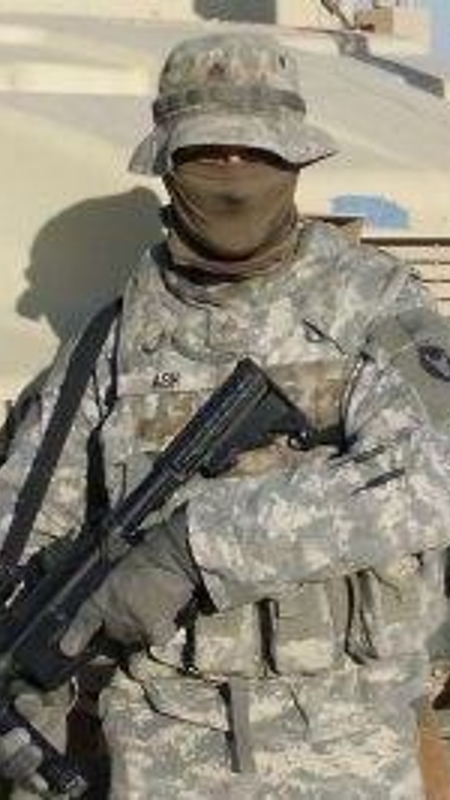
During that time, Kevin was a combat infantryman in Fallujah and was regularly exposed to improvised explosive devices (IEDs). He didn’t share as much about that experience with his family.
But Kevin continued to give 110% to his unit and was recognized for his actions in Iraq, receiving commendations including the Iraq Campaign Medal, the Army Achievement Medal, the Army Good Conduct Medal, National Defense Service Medal, Combat Infantryman Medal, and the Global War on Terrorism Service Medal, adding to his medals from his service in Kosovo.
Kevin truly believed that his service in Operation Iraqi Freedom, Operation Enduring Freedom, and Operation New Dawn was to ensure safety and freedom for everyone, no matter their differences.
When he returned home in 2007, Kevin began fighting a very different battle. He experienced blackouts, dizziness, and symptoms similar to PTSD. He was newly married and his wife had difficulties understanding his mood changes, outbursts, struggles with sleep, night terrors, depression and anxiety. Family members agreed that Kevin had changed after his time in Iraq and encouraged him to seek help through the VA.
While the local VA hospital ascribed his symptoms to PTSD, he fell short of the number required for an official diagnosis. Kevin didn’t want to pursue that line of inquiry anyway because he felt it would have been a black mark on his record and wouldn’t allow him to continue serving in the military or to pursue a career in law enforcement.
Despite difficulties with his memory, Kevin still managed to complete his associate degree in law enforcement in 2009. However, Kevin was unable to secure a position in his desired field. He decided to focus on a military career, earning the rank of Sergeant just prior to his final deployment to Iraq and Kuwait.
Although he was already struggling with symptoms of what we now know was CTE, Kevin volunteered for this deployment because he thought being with his military brothers was the right thing to do.
Several months after reaching Kuwait, Kevin began sending ominous emails saying goodbye to family members, and that he wouldn’t make it back from his deployment. His family worried that he was suicidal and reached out to the military to alert them. Within 24 hours of a phone call by his mother to the Minnesota Chaplin for the Red Bulls, Kevin was evaluated and it was determined that he should be removed from his tour of duty. He was evacuated to Germany, eventually completing his term with the Warrior Transition Unit in El Paso, TX. After receiving psychiatric help for suicidal ideation, anxiety and depression, Kevin was honorably discharged at Fort Bliss in 2012.
Kevin’s struggles continued as he isolated himself from his friends and family. His young wife filed for divorce. He became completely withdrawn, taking a third shift job at a factory that would allow him to work alone.
To help himself cope, Kevin returned to athletics. He began working out, focusing on training to complete in Iron Man event. He started to get into mixed martial arts, and joined a rugby team that seemed to give him a new band of brothers. Slowly, his family thought he was swinging back around to connection, to joy, and to life.
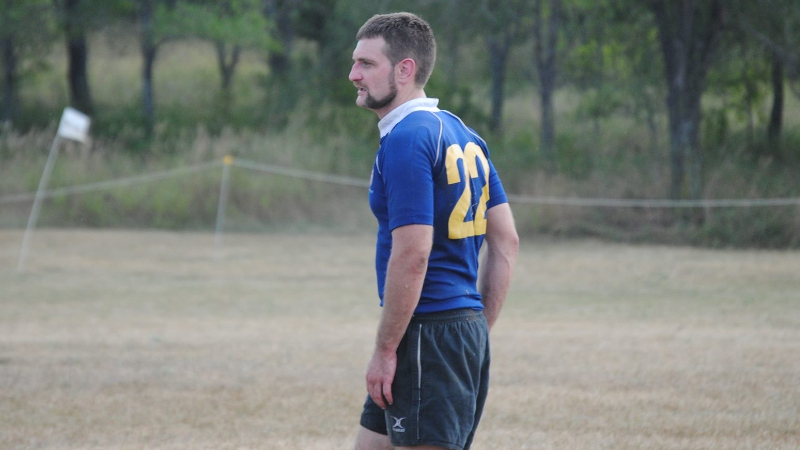
On September 21, 2013, Kevin made an unremarkable tackle in rugby game. The game would mark the beginning of the end of Kevin’s life from CTE. At the time, no one understood how such a routine tackle resulted in such a catastrophic Traumatic Brain Injury. He started breathing erratically, prompting a 911 call, and the first responders called for ambulance transportation. When he arrived at the hospital Kevin’s Glasgow Scale was a 2 (a score of 3 or less indicates the person is totally unresponsive to a set of defined stimuli). The impact on Kevin’s brain was unlike anything the doctors had ever seen, as the neurons throughout Kevin’s entire brain seemed to have sheared away from each other. No one could explain how that hit had caused such a devastating injury.
Kevin was placed in a medically induced coma for two weeks to allow the brain swelling to go down. Kevin experienced continuous seizures as he woke up from the coma.
For two months, he was hospitalized in St. Paul, then moved to the Minneapolis VA hospital for another six months. Kevin was a puzzle to his doctors and therapists who were unable to easily stabilize him and account for such extreme symptoms. He did not respond to treatments in what were typically expected manners. The TBI left Kevin blind, hearing impaired, and with early onset dementia. He was unable to sit or stand on his own, and he struggled to control movements on the right side of his body. The 31-year-old former soldier and athlete was unable to care for himself without assistance and he required constant one-on-one supervision.
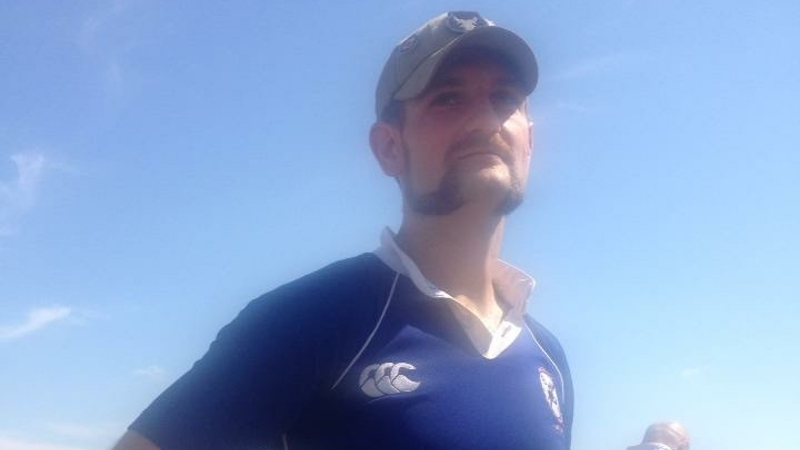
Despite his many challenges, Kevin could talk and he often said he felt like he was trapped in a nightmare he couldn’t escape. He said he dreamt in colors and in his dreams he could run, see, and be part of the world again. He could not understand what had happened to him and his life.
Kevin continued to show symptoms that doctors wrote off as anxiety, depression, PTSD, or consequences of the concussion from the rugby tackle. Doctors and therapists never considered that his condition was related to the concussive and sub-concussive IED incidents and combat missions from his deployments. Kevin knew there was something more to his story, but his family struggled to find anyone who would take his whole history into account.
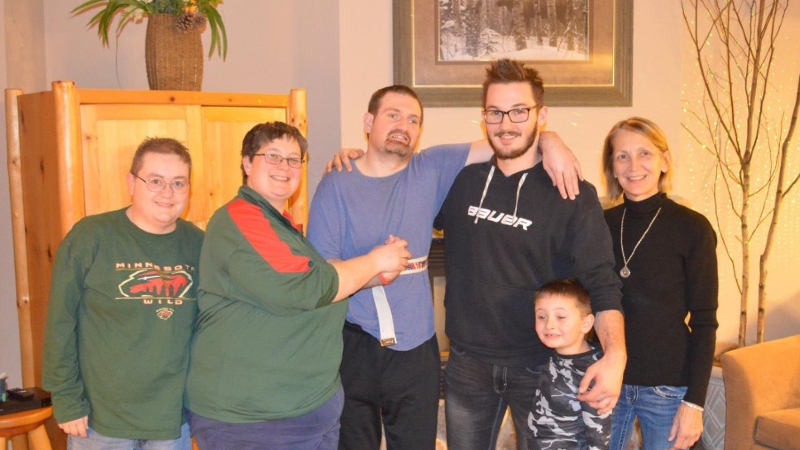
After eight months of hospitalization, Kevin was moved to a group home, where his family insisted that he participate in physical therapy, horse therapy, and contribute by volunteering at a cat rescue. He went to a local fitness center and worked out with a personal trainer secured by his family. His recovery seemed to be going well, but then his rehabilitation progress stopped. His family watched as this young, strong, independent, loving man lost his love of life, his ability to care for himself and he eventually became unable to roll over, sit, walk, or even swallow.
After suffering a fall at his care facility, Kevin’s condition deteriorated rapidly and the medical professionals attributed the decline to “failure to thrive.” He was transferred back to the VA medical hospital in Minneapolis, MN, where he was evaluated, and finally he entered hospice care. Kevin was released from his struggles after just 34 years on this earth when he passed on January 15, 2017.
Since Kevin’s death, his family questioned everything that had happened during Kevin’s deployments, and the final four years of his life. Why had an ordinary rugby tackle resulted in such trauma to his brain? Why had his behavior changed so radically after his second deployment? What was everyone missing?
Their search for answers led them to donate Kevin’s brain to Boston University’s CTE Center where research could provide Kevin with the opportunity to continue to serve and could provide answers for their family.
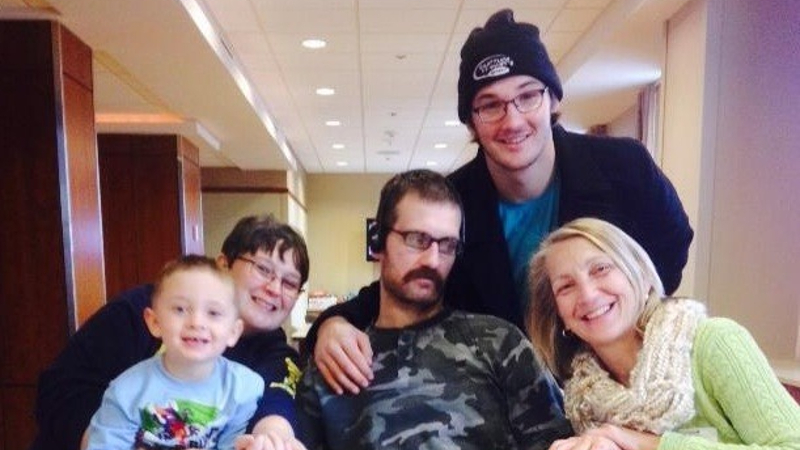
In July 2017, Dr. Ann McKee called Kevin’s mother and confirmed her suspicions that Kevin’s brain had begun to deteriorate long before the rugby accident. The tackle and subsequent TBI only accelerated his deterioration. Dr. McKee confirmed that Kevin had CTE, likely from the years of concussive impacts to his brain from IED’s and combat. The blow from the rugby tackle was the proverbial final straw.
The last 10 years of Kevin’s life, with all the symptoms that appeared following his first Iraq deployment, started to fall into place. His family is just beginning to understand exactly how much his life and his mind endured. They donated his brain in hopes that through this ultimate sacrifice and service we can start to understand the impact of CTE and diagnose it sooner.
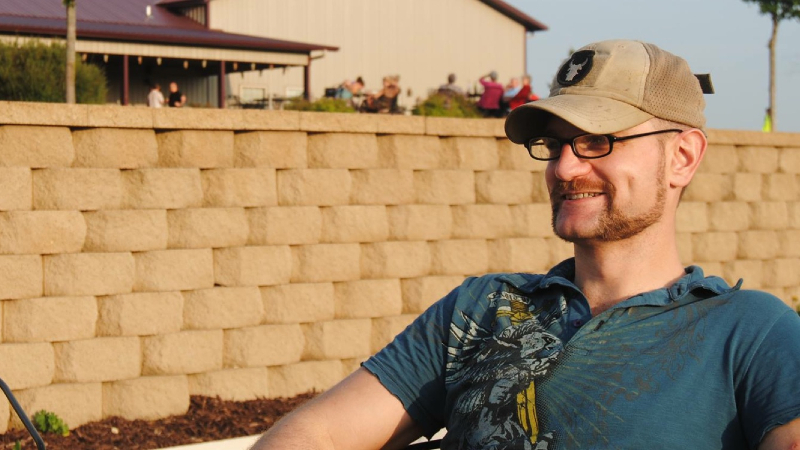
An untitled poem written by Sgt. Kevin Ash
Kevin Ash wrote this poem during one of his tours in Iraq. His mother, Joy, estimates he wrote it around 2006.
Inspired by pain and anger
I continue to force my body to drive on.
This madness inside of me drowns the voices all around me.
Gripped by war, I continue to live on.
Why am I full of this thing inside me?
What is it?
This darkness, this hole that cannot take shape.
I cannot fight its ever-changing shape as it starts to surround me, drinking the light around it.
But even so my feet will not move.
I will not run!
They stay planted in the blood stained ground
Like that of aged oak trees standing against the test time.
You May Also Like
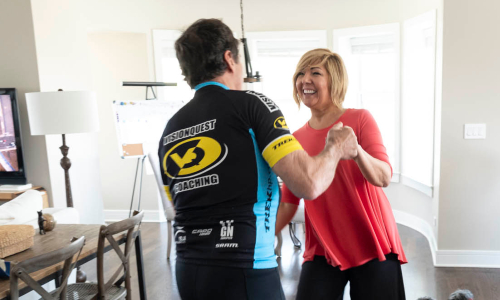
Although we cannot yet accurately diagnose CTE in living people, a specialist can help treat the symptoms presenting the most challenges.
CTE Treatments